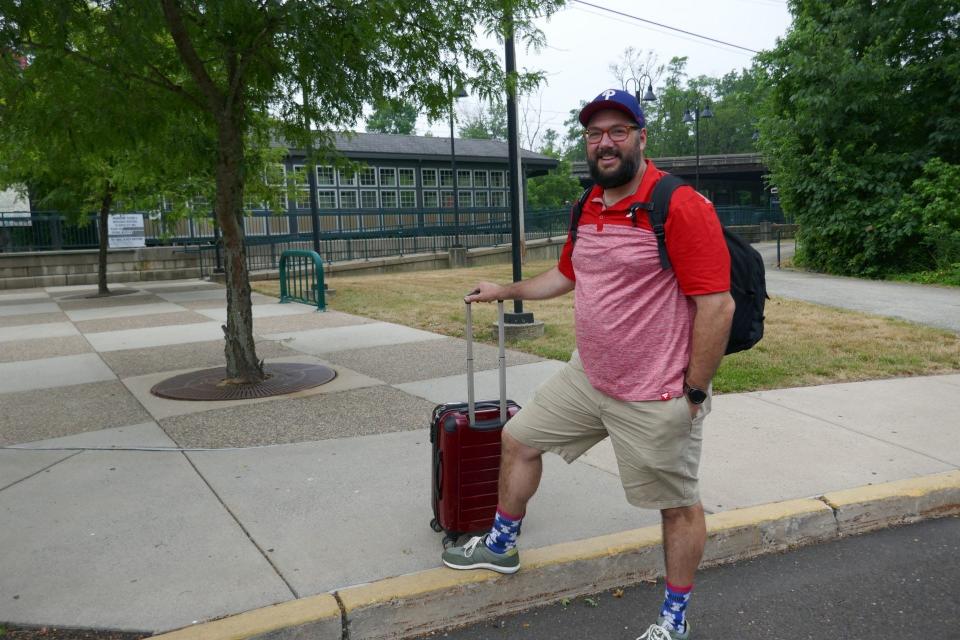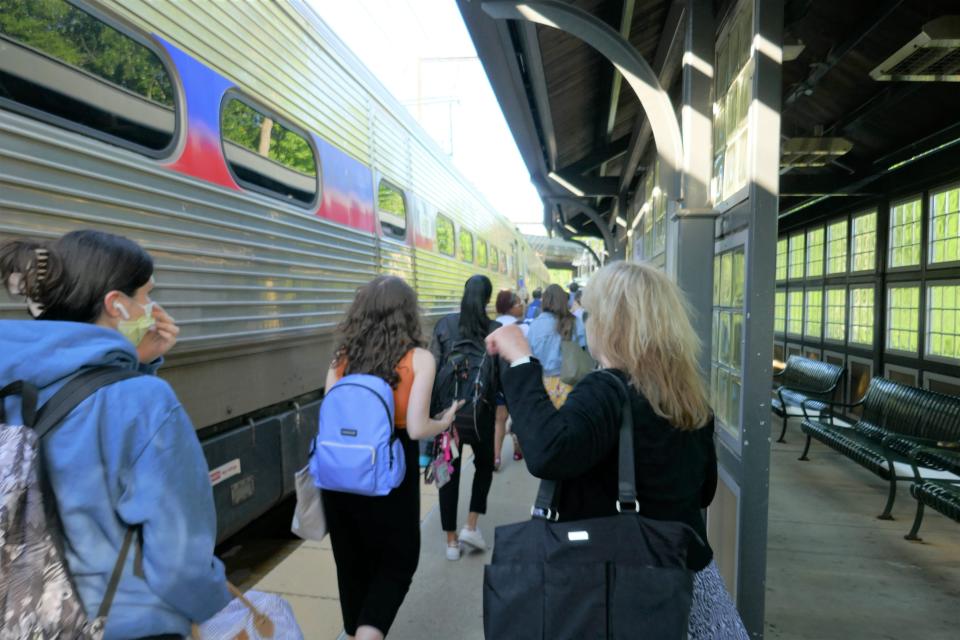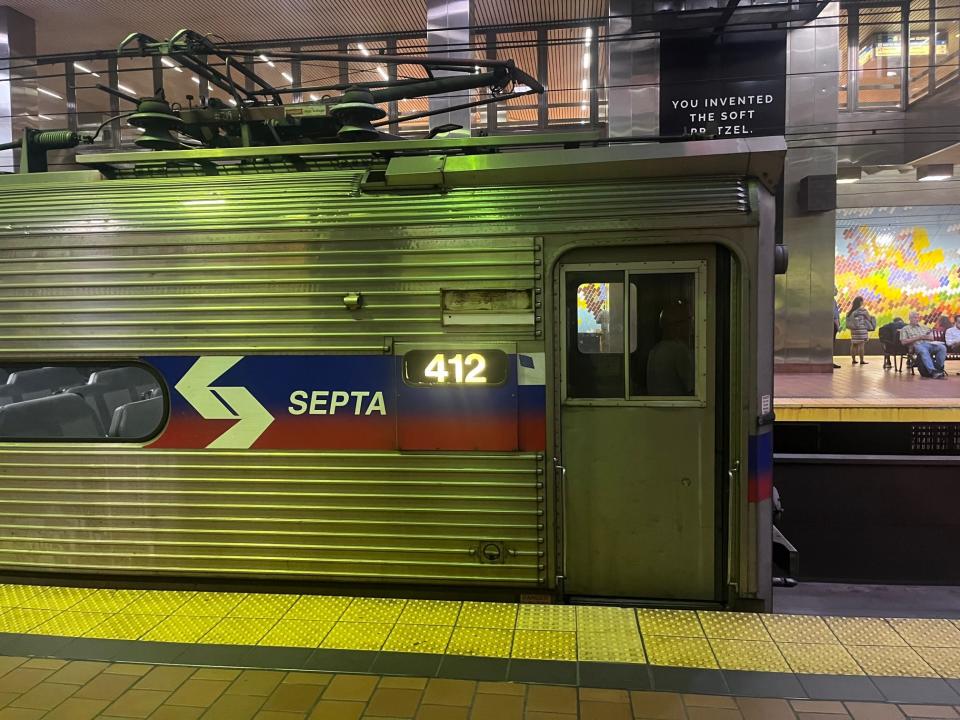Why is SEPTA canceling trains? Here's the reason and it might get worse.
If you’d like to watch a regional train system fail, it might look a little like SEPTA did on its worst day during the I-95 collapse in Northeast Philly in June.
A heart fails when it doesn’t pump enough blood. And on June 19, Philadelphia’s regional rail system didn’t deliver enough trains.
At least 20 cancellations and significant delays were announced on the regional rail system that day across a dozen or so official Twitter accounts, each with a refrain now familiar to riders of SEPTA.
Crew unavailability.
Put simply, SEPTA didn’t have people to run the trains.
The regional rail is a quiet workhorse of the Delaware Valley commute, keeping tens of thousands of cars from clogging the interstates. Before the pandemic, the 13 lines of the regional rail system carried nearly as many passengers as cars on I-95, and still ferry 66,000 commuters each day from Delaware, New Jersey and the collar counties of Philly.
But even a small surge in demand when a section of I-95 collapsed, about 15% more passengers on four northeastern rail lines, revealed a critical point of fragility: a staffing shortage that the union covering regional rail engineers says is about to get much worse as SEPTA workers retire or quit for more pay.
The union says the system is nearing its breaking point, barely masked by the practice of paying salaried managers to cover shifts as needed.
Meanwhile, the agency faces a looming funding crisis of historic proportions, prompting warnings of service cuts and fare increases. The engineer shortage means some question SEPTA’s ability to serve Philadelphia’s vast suburbs even in the near term.
“It’s not just the highway that’s collapsed, we’re seeing the collapse of SEPTA’s regional rail,” said Don Hill, a SEPTA engineer who leads the local branch of Brotherhood of Locomotive Engineers and Trainmen, the regional rail engineer union.
SEPTA says it is training engineers to replenish the ranks. But transit systems across the country are facing operator shortages.
“Certainly, it's most acute in the Philadelphia area on the regional rail service,” said Connor Descheemaker, of advocacy group Transit Forward Philly.
Opinion: Delaware needs express trains to Philly — and soon. Here's why
During the collapse: I-95 bridge collapse: What you need to know about the disaster in Philadelphia
A nationwide transit worker shortage could spell more trouble for SEPTA

June’s most significant event for SEPTA’s regional rail system probably didn’t even happen on I-95, said Hill.
It happened, instead, at a sports hall in West Philadelphia.
The Arlen Specter U.S. Squash Center, a cavernous vaulted space that itself looks a bit like a train station, was home on June 14 to an Amtrak hiring fair meant to help the train behemoth fill a shortfall of 4,000 positions across the country.
A SEPTA locomotive engineer can top out at $39 an hour, after building up 15 years of seniority. But for train engineers with four or five years' experience, a move to Amtrak can mean a pay hike of $15 or $20 an hour, union officials say.
Those numbers lead to constant churn that’s getting only worse amid a nationwide worker shortage, they say, for engineers that can take two years to train fully.
The results, Hill said, are predictable.
“If SEPTA was high school, that hiring fair would have looked like a high school reunion,” Hill said. Former SEPTA employees were doing the hiring, he said. And current SEPTA engineers were picking up preliminary job offers on the spot. Amtrak officials did not respond to requests for comment.
You can’t blame Amtrak for SEPTA’s woes retaining employees, said James Louis, a national BLET union vice president who consults on rail companies across the region. Other rail lines in the region average closer to $50 an hour, he said.
“I’m in my 47th year as a railroader,” Louis said. “And SEPTA is the worst of the worst.”
Resignation letters from SEPTA workers departing for Amtrak over the past year — which USA TODAY Network was able to review — showed a similar litany of complaints.
Lower pay than others in the industry. Unpredictable hours. Bad morale. The perception that management viewed them as disposable.
“It has become apparent that the salary and benefits offered by SEPTA fall below the industry standards,” reads a resignation letter from one SEPTA engineer leaving for Amtrak this month. The engineer cited overall low morale among his colleagues.
“After 14 years, I didn’t anticipate starting over. I honestly thought I would retire with SEPTA,” read another letter from this year. “With the future looking very unstable for the regional rail division, I’ve decided to move on.”
After their last contract expired in March, the rail engineers' fight over wages and benefits sits in federal mediation. SEPTA spokesman Andrew Busch acknowledges the tight labor market, and said the agency shared the difficulty of many other transit agencies in attracting engineers, and has ramped up training programs.
“Certainly we want to keep their pay competitive to be fair to them,” Busch said. “But then also to make sure that these are attractive and competitive jobs. We do think they are.”
An interstate collapse showed SEPTA's necessity, but stretched resources thin

The regional transit authority acted swiftly to respond to the need after a section of I-95 collapsed in Northeast Philadelphia during the early morning of June 11, shutting down one of the region's essential car corridors.
SEPTA added extra morning and evening trains to Trenton, connecting the system to transit in New Jersey and beyond, and added cars to other lines. SEPTA would keep the city working.
But with staffing tight, adding lines to Bucks County and Trenton meant canceling another train line entirely — the ill-used Cynwyd line — and switching that route to bus service.
Still, at least 38 regional trains were announced as canceled or substantially delayed during the 12-day freeway collapse for lack of people to run them.
On June 16 two trains out of Delaware were canceled, and two more didn’t make it to the airport — leaving would-be passengers to wait anywhere from 30 minutes to an hour for the next train, in hopes their job or their airplane would still be waiting for them.
Cancellations have continued at a slower clip on the regional lines after the interstate re-opened. At least 18 trains were canceled or delayed for crew unavailability over the three weeks after I-95 came back online, about the same as before the interstate collapse.
Commuters at Jefferson Station in Philly laughed knowingly when asked about train delays — and one Delaware County rider, who identified himself as Paul, said he had to find another way home when a train to Media decided not to arrive in June.
Though SEPTA is budgeted at 213 engineers, the agency’s engineer roster has dropped by dozens since the pandemic. It now sits at 174 engineers, said Busch, the SEPTA spokesman.
Union head Hill laughed at that number. He said the count is more like 160 or worse, once you subtract people who’ve long been off the active roster or already filed their resignation — grim numbers he said management has confirmed internally.
To keep all trains running, the current regional rail schedule requires 141 engineers each weekday. Sick days and vacations mean the count is close to the bone. Every day is a potential transit crisis, Hill said.
Busch said 26 engineers are in training, enough to help replenish the ranks. But historically, Hill said, about half of would-be engineers don't successfully complete the program.
He knows of six more engineers due to resign, plus a wave of retirements by next year.
While engineers ask for a better contract, SEPTA remains underfunded

As engineers fight for pay, SEPTA is facing its own funding crisis. As of May, regional rail ridership had only recovered to 55% of pre-pandemic levels, handcuffing revenue.
This year’s SEPTA budget, which began July 1, is the final year that the agency will have the use of federal COVID relief funds, leaving a projected $240 million hole in the budget next year.
“Without something to substitute that, we're looking at losing about 20% of our operating budget,” Busch said. “We don't really have many methods available to us to do that other than service cuts, and fare increases.”
Neither will help bring back riders, said transit advocate Descheemaker. And a legal quirk means SEPTA is largely dependent on the state of Pennsylvania for funds.
“SEPTA receives the lowest proportion of local funding of its operating expenses of any transit system in the country," Descheemaker said. A Pennsylvania law prohibits counties from raising taxes to pay for public transportation.
This prohibition is costly, said Descheemaker: It could lock SEPTA out of receiving money from the $550 billion infrastructure bill passed by President Joe Biden in 2021. Those federal grants, which cover capital expenses like train upgrades, generally require local matching funds.
State Rep. Joseph Hohenstein, a Democrat from Philadelphia, stood with SEPTA officials on the steps of the state capitol on June 20, publicizing a bill he co-sponsored to change state law to allow counties to raise extra funds.
“As we have seen this past week, when a transportation crisis occurs, we lean on our public transit system,” Hohenstein told reporters. “SEPTA has stepped up with increased services while I-95 is being repaired. Now we need to step up and give it funding flexibility.”
That bill has been parked in committee since June 12. Other congressional calls for emergency SEPTA funding have also lain fallow since I-95 reopened.
As more engineers leave for greener pastures, union head Hill worries that either train service will drop, or engineers will be stretched thin with grueling split shifts that could cause yet more engineers to depart, he said.
Soon, he said, SEPTA might not have any way to avoid this devil's dilemma.
“They don’t have a lot of options,” Hill said. “The way things are now, they have no extras. There are no reserves.”
Matthew Korfhage is a Philadelphia-based regional reporter. He can be reached at mkorfhage@gannett.com.
This article originally appeared on USA TODAY NETWORK: Philadelphia's SEPTA rail system short of staff, and canceling trains

